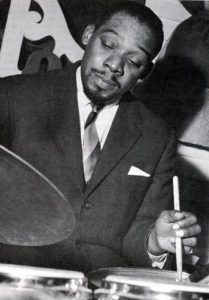
Kenny Clark
Kenny Clarke was born on this date in 1914. He was a Black jazz drummer and bandleader.
Kenneth Spearman Clarke was born into a musical family in Pittsburgh. He studied piano, trombone, drums, vibraphone, and music theory in public schools. From 1929 to 1933, he had his first professional experience as a drummer with Leroy Bradley’s Band and later with Roy Eldridge. In 1934, he left Pittsburgh for a short stint in St. Louis and eventually moved to New York. There, he joined the Edgar Hayes Orchestra, and in 1937, he made his first European tour and recording debut.
While abroad, he met and played with several musicians, including Dizzy Gillespie. Clarke and Gillespie developed the fundamental rhythmic and melodic concepts of bebop. The main difference in the rhythm’s pulse is heard in the cymbals, and the drums provide accents and punctuation. This freed the drums from their traditional role as a time-keeping instrument. His irregular beats became known as dropping bombs and klook-mops, and Clarke's nickname became Klook.
As a composer, Clarke collaborated on two enduring jazz standards: "Salt Peanuts" and "Epistrophy (a.k.a.) Fly Right."
1943, Clarke was drafted into the Army, serving in Europe until 1946. For the next ten years, he toured and recorded extensively with Gillespie, Thelonious Monk, Miles Davis, and others. 1952, Clarke co-founded the Modern Jazz Quartet while continuing to lead smaller groups, such as Bohemia After Dark in 1955 and Klook’s Clique in 1956. Then he settled in Paris, and 1962, he formed a group called the Three Bosses, which included expatriate Bud Powell and Oscar Pettiford.
From 1960 to 1973, he joined Belgian pianist Francy Boland to create the Francy Boland Big Band. Kenny Clarke died on January 26, 1985, in Paris.
Jazz: A History of the New York Scene
Samuel Charters and Leonard Kunstadt
(Doubleday, Garden City, N.Y., 1962)